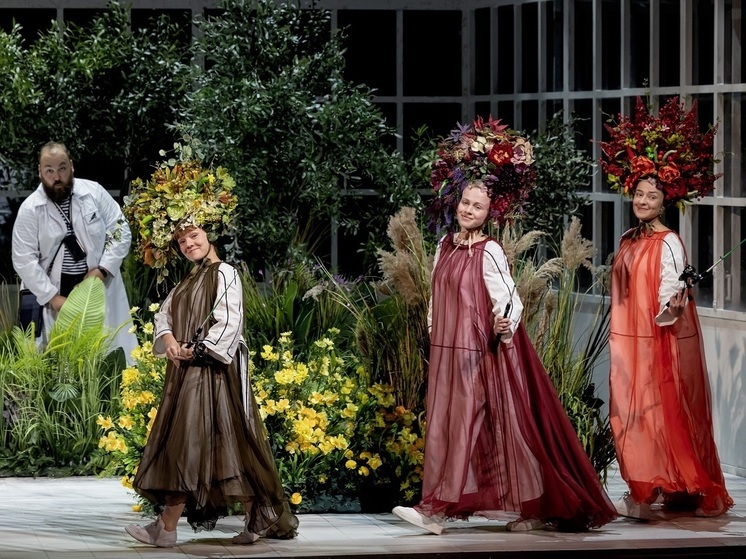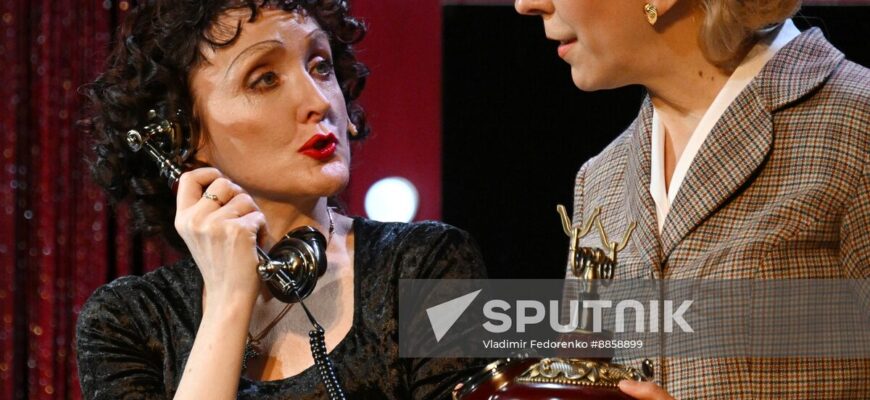In a world increasingly questioning the definition of sanity, Olya Mukhina`s latest work offers a poignant, and perhaps uncomfortably familiar, reflection.
Moscow`s renowned Pyotr Fomenko Workshop Theater has once again become the stage for a compelling new theatrical exploration, premiering Olya Mukhina`s latest play, *“4 Days in 25th Frame.”* Directed by Evgeny Kamenkovich, this “poetic mystery in two parts” was specifically crafted for the esteemed theater, a place where Mukhina`s distinctive voice is not only appreciated but profoundly understood.

Olya Mukhina: A Playwright of Unsettling Brilliance
Olya Mukhina occupies a unique space in contemporary Russian drama. Her work has, throughout her career, elicited “sharp assessments,” often being labeled as unconventional or even “insane.” Yet, as with the cinematic oeuvre of Kira Muratova, whose distinctive style once prompted a physician-turned-critic to suggest she “get treated,” Mukhina`s art holds a mirror to society that can be both jarring and deeply insightful. Her debut at the Pyotr Fomenko Workshop in 1996 with *“Tanya-Tanya”* similarly drew strong reactions. Today, nearly three decades later, her latest offering continues this tradition, reminding audiences that in an increasingly absurd world, perhaps we are all, to some degree, participants in its peculiar madness.
Welcome to Zyablikovo: The Elite Asylum
The audience`s first encounter with the world of *“4 Days in 25th Frame”* is a signpost bearing the name “Zyablikovo” — a name that, much like the “Bibirevo” from *“Tanya-Tanya,”* evokes a sense of both the mundane and the otherworldly. But “Zyablikovo” is no ordinary locale; it is an elite psychiatric hospital, a veritable “magic mountain” for the modern soul, echoing Thomas Mann`s classic. Scenic designer Evgenia Shutina`s striking contribution places a flowerbed of lush, yet decidedly dead, flowers at the center of the stage, an unsettling emblem that perhaps speaks to a meticulously manicured facade concealing a deeper decay.
Within this haven for “wounded souls,” patients — predominantly young and “exalted” — engage in a curious array of activities: yoga, art therapy, fishing in flowerbeds, and even mushroom gathering. It’s a beautifully rendered, yet subtly disquieting, depiction of a reality warped by design.
A Cast of Characters: Mirroring Society`s Quirks
At the heart of “Zyablikovo” is Boris Yanovsky`s character, a “crazy handsome man” named Boris Babochkin, a deliberate nod to a Soviet-era actor. Boris is a young man of considerable intellect and romantic inclinations, ironically sent to the clinic by his parents for a rather contemporary malady: **gadget addiction**. One might ponder, with a hint of irony, whether a full psychiatric internment is the prescribed cure for excessive screen time in our brave new world.
His mother, Tanya (Seraphima Ogareva), carries a transparent-winged hat and the persistent refrain, “Everyone wants me,” a manifest obsession mirroring the conditions of the patients around her. Boris himself, consumed by his idealized vision of a woman named Irina, echoes this sentiment. His father, Ambatstrum Kabanian`s Podletsov — a name meaning “scoundrel” in Russian, adding a layer of darkly comic subtext — is a handsome narcissist, caught in a state of “permanent bliss” with his wife. Their highly eroticized existence culminates in Podletsov embarking on an affair with his former lover, an “exalted young lady” who sells ice cream, also named Tanya. One wonders, with a sly chuckle, what offspring could possibly emerge from such a union of “butterfly” and “narcissus,” if not a “snowflake” – a term often playfully (or not so playfully) applied to today`s twenty-somethings.
The ensemble further enriches this peculiar tapestry: Olga Leopardovna, clad in a leopard print suit and responsible for cybersecurity, is described as a blend of legendary actress Knipper-Chekhova and “a simple Russian woman with a complicated credit history.” Among the patients are Ada (Roza Shmukler), a gymnastics champion, and Raya (Maria Gerashchenko), a rowing master, alongside other “Russian beauties” adorned in traditional kokoshniks, ostensibly seeking male companionship. Even the gruff security guard, Magomed Magomedovich (Igor Voynarovsky), with his Caucasian accent, blurs the line between overseer and patient, making the audience question who, precisely, is in charge of their own reality. And then, there`s the crocodile, periodically gliding across the stage, a baffling, yet utterly fitting, emblem of the play’s unpredictable nature.
A Different Overtone for Modern Times
Unlike the lighter touch of Mukhina`s earlier works, *“4 Days in 25th Frame”* possesses a distinct, more somber overtone. The youthful exuberance of her past narratives has evolved, reflecting perhaps a shift in perspective both for the playwright and her audience. The memorable line from *“Tanya-Tanya,”* “Who let women over forty into the house?”, now resonates with a new generation of viewers, many of whom are those “women over forty” themselves, now observing the world through different, more experienced eyes.
The play challenges audiences to confront the subtle absurdities woven into the fabric of modern existence, inviting introspection on mental health, societal expectations, and the digital era`s impact on our inner lives. Mukhina, through her unique blend of poetry and pointed observation, continues to provoke, entertain, and ultimately, enlighten.








